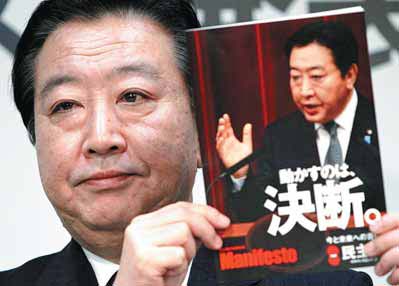Japanese Prime Minister Yoshihiko Noda literally hit the stump while campaigning for a seat in his country's House of Representatives.
He tumbled off a campaign van when speaking in Anjyou, Aichi prefecture, on Monday, and some Japanese voters are worried that he is physically incapable of making more than 90 street speeches throughout Japan before the Dec 16 election.
 |
|
Japan's Prime Minister Yoshihiko Noda, who is also the leader of the ruling Democratic Party of Japan, shows a copy of the party's campaign platform for the Dec 16 lower house election at the party headquarters in Tokyo on Tuesday. [Photo/Agencies] |
But his words can't hide from his supporters a very uncomfortable truth: The ruling DPJ is lagging behind the main opposition Liberal Democratic Party, led by Shinzo Abe, and the Japan Restoration Party, led by former Tokyo governor Shintaro Ishihara and current Osaka Mayor Toru Hashimoto, according to a pre-election survey by Kyodo News.
Noda criticized Abe for putting sand in the wheels of Japan's diplomacy by provoking China on several issues, including the Diaoyu Islands.
"Tough talk", as Noda said in an interview with Financial Times, is an approach that leaders of some Japanese parties are taking to win votes.
"This kind of (ultranationalist) atmosphere or mood is emerging, and it's possible that tough talk could captivate the public, but that would be the most dangerous thing for the nation," he said.
Differentiating itself from its hawkish rivals, the DPJ vowed on Tuesday to defend Japan's interests with "cool-headed and practical" diplomacy in its election manifesto. "To protect the people's lives and assets is the most important role of the government. By combining 'cool-headed diplomacy' with 'responsible defense' and deepening the US-Japan alliance, we will ensure our nation's defense," its platform said.
Meanwhile, speaking on a TV Asahi program on Sunday, Abe reiterated his party's position that Japan's Self-Defense Forces be given the status of "national defense forces".
"The first and second clauses of Article 9 of the Constitution give the impression that Japan can never have a military, and they are confusing. We should stop twisting the facts," he said.
Former Tokyo governor Shintaro Ishihara, a potential kingmaker in next month's general election, said on Monday that Japan should produce arms for export overseas so its advanced military technology can act as a deterrent.
"We should sell as many excellent weapons as possible. … The technologies are much more advanced. We should seriously consider this," Ishihara told a group of reporters.
Speaking at the Foreign Correspondents' Club of Japan, he took aim at China, a favorite bogeyman of Japan's right. "In theory, it would be good if Japan and China could foster friendship, but Chinese policy is that of hegemony."
Applauding the LDP's campaign policies on security, a Yomiuri Shimbun editorial said Japan's national security environment has become increasingly severe in the face of China's rapid military buildup and the nuclear weapons program in the Democratic People's Republic of Korea.
Japan's main parties, including the LDP, the Japan Restoration Party, the DPJ, People's Life First and Your Party tend to support amending Japan's pacifist constitution.
Contact the writer at caihong@chinadaily.com.cn
The reporter is the Tokyo bureau chief of China Daily.